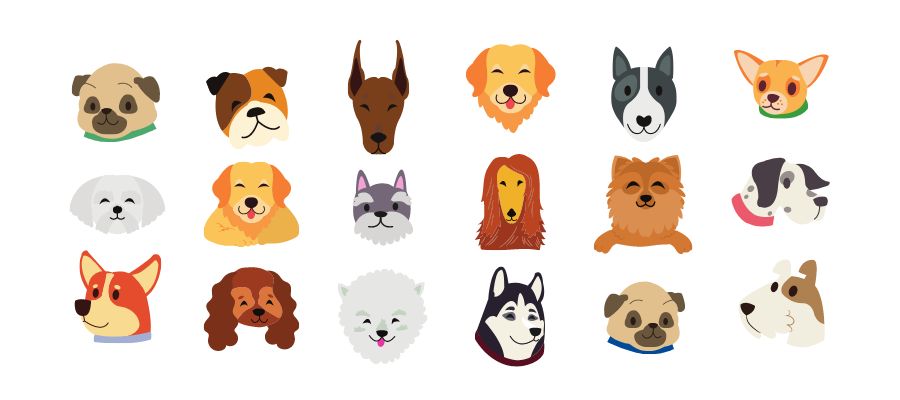Vegetarian or vegan diets have become a very popular trend, and more and more people join in leading a lifestyle of this type. Those with a dog wonder if their dog can be vegan or vegetarian.
Also, many vegans and vegetarians have pets, so they may be in a dilemma, wondering if their dog can be too. Dogs are omnivorous animals, and veterinarians recommend not feeding a diet where meat is excluded.
However, there are countries where it has adapted very well to this type of diet in dogs. Even feeds have been created that do not contain meat in their ingredients. But is it good to feed a dog this way? Is it possible for a dog to be vegetarian or vegan?
Difference Between Vegan and Vegetarian
There is vegetarianism and veganism.
Many tend to confuse both terms or think they are the same, but they are not.
- Vegetarianism has, as a principle, stopped eating meat or fish (of any kind).
- Veganism is a stricter lifestyle in which you cannot consume any food that comes from animal origin. Among these foods are dairy, and eggs, among others.
Can Dogs be Vegan or Vegetarian?
Dogs are animals that are designed to consume meat. They have visible points that help to recognize it, such as their teeth and hooves.
The dog’s body lacks the enzymes necessary to digest the starch in vegetarian food. Human beings can digest a wide variety of foods. On the other hand, a dog’s digestive tract is prepared to digest meat.
For humans, digesting vegetables is a little slower, and it happens similarly in dogs since they have a shorter digestive process and more acidic gastric juices than humans.
Making drastic changes to a dog’s diet is possible, but it takes a series of constant and exhaustive visits to a veterinarian.
The controls will help you, as an adopter, to ensure that the dog does not have nutritional deficiencies and can continue its life normally.
Advantages and disadvantages of the vegan/vegetarian diet for dogs

Starting with a vegan or vegetarian lifestyle is an individual choice. In addition, this change has advantages and disadvantages for dogs, which must be considered.
Advantages of the vegetarian or vegan diet in dogs:
Dogs subjected to a diet where meat is not present show better vitality. This, in some cases, is due to food supplements that replace animal protein.
- Decrease in cancer and hypothyroidism:
According to studies conducted by Andre Knight and Madelaine, many animals fed this way have been able to prevent cancer significantly. The decline in disease in vegan dogs has been staggering, and this may be because their diet is more natural.
- Absence of fleas and other external parasites:
Parasites are very common in dogs, so finding them on the skin and hair is almost daily. However, a vegan diet can help keep its appearance under control.
A dog’s fur is one of the most striking areas and requires very important care. A diet based on vegetables and fruits helps revitalize the hair, its softness and shine.
- Helps control allergies:
By removing chemicals from the dog’s diet, it is common for rare allergies to begin to disappear.
The vegetarian or vegan diet excludes chemicals, and therefore it is unlikely that the dog will have allergic symptoms (as long as the origin of its allergy is food).
- Control weight and diabetes:
Diabetes in dogs is a disease that a veterinarian must supervise.
A healthy diet will help the dog to control its weight, improve sugar intake, avoid being overweight and, consequently, the onset of diabetes.
Likewise, it is also possible that a vegetarian diet prevents the appearance of cataracts.
However, age is a determining factor for certain diseases or ailments.
A healthy diet can help prevent age changes from causing serious problems for your pet.
Disadvantages of the Vegetarian or Vegan Diet in Dogs:
Dogs are animals that require vitamins, proteins and many minerals.
Vegan/vegetarian diets should be able to replace supplements offered by animal foods, such as carbohydrates and proteins.
Therefore, a diet of this type must have a large proportion of these elements to replace the lack of animal tissue.
- Protein needs:
Adult dogs should consume around 18% protein in their diet.
Proteins and amino acids are necessary to keep the dog’s metabolism healthy.
The dog is an omnivorous animal, different from cats, but even so, its entire diet must not be of plant origin because it does not provide the necessary vitamins.
- Stomach infections:
The urinary tract of a vegetarian/vegan dog is more prone to urinary tract infections. This is due to the absence of taurine, methionine and fatty acids that meat provides.
In addition, dogs do not support huge amounts of fiber. Although they are necessary, it is incorrect that they consume them excessively, as they have a shorter digestive system than humans.
Dogs require essential amino acids, which are not acquired by dietary supplements. Without them, they can have diarrhea and other problems.
Important: Getting rid of parasites in dogs can be very simple.
A balanced diet with vegetables helps prevent them from appearing, which is considered an advantage, as mentioned before. However, spinach, asparagus, and beets can be highly toxic.
When changing a dog’s eating style, the supervision of a veterinarian is essential. The expert must design a balanced diet supplemented with the necessary supplements.
Many foods can be prepared at home, but the important thing is not to make sudden changes in food because this can cause sudden changes in the body. By doing so, the veterinarian could suspend the vegetarian/vegan diet if it affects the dog’s health.

Vegan/Vegetarian Food for Dogs
Feeding a vegetarian or vegan dog is possible with the help of feed. It is possible that a dog could be fed entirely on plant protein. A vegan diet based on vegetables, vegetables, lentils and proteins is possible and very common.
However, many adopters do not know recipes to offer their dogs, so a specialized plant-based feed is their best option.
Some vegan/vegetarian feeds are :
This organic feed is balanced with 100% vegan ingredients. It does not contain meat and is made with an improved recipe, which helps provide energy and the digestibility that a dog needs.
- I think Vegan Benevo Regular
Benevo dogs is a food that manages to satisfy all the nutritional needs of adult dogs. Contains no animal products such as eggs or dairy. In addition, it is approved by the Vegetarian Society.
Foods that the Vegetarian Dog can Consume
In many circumstances, adopters do not trust the ideal feed for vegan dogs. Opting for homemade food is feasible for people with a lot of nutritional training in dogs. They can provide your pet with fresh food with all-natural, plant-based ingredients.
It is a great challenge that these foods can nutritionally complement the body and keep it balanced. For that reason, prescriptions approved by a veterinarian must be used.
Finding a vegetarian recipe for dogs can be challenging, but having choices of ingredients can create different dishes for your pet.
Some ingredients that can be used are:
In a dog’s diet, vegetables are essential:
- Carrot.
- Zucchini.
- Spinach.
- Green beans.
- Chard.
Fruits cannot be excluded from the list of special foods in a vegan/vegetarian diet.
These can be:
- Apple.
- Pear.
- Coconut.
- Peach.
- Cherry.
- Strawberry.
- Medlar.
- blueberries
Similarly, spices should be considered to flavor a vegan/vegetarian bowl intended for a dog.
Among the most popular spices, the following stand out:
- Basil.
- Thyme.
- Parsley.
- Oregano.
- Cumin.
- Thyme.
- Rosemary.
What Should be a Good Vegetarian or Vegan diet for Dogs?
A balanced diet with plant-based products must be completely natural. In this way, the digestibility of the dog is maximized. Vegetarian food should contain 22% protein for puppies. Instead, for adult dogs, this number should be about 18%.
To achieve these numbers, legumes and peas can be included in the diet because they are rich in vegetable protein.
- Fatty acids and Omega 3/6:
Fatty acids and Omega 3-6 are essential in a dog’s diet. This helps their skin and coat.
- Digestible carbohydrates:
Carbohydrates are essential to the diet of dogs, accompanied by fats and proteins. Carbohydrates are the main source of energy for the dog. In addition, they are rich in fiber, which benefits your gastrointestinal health.
Digestible carbohydrates are those that provide energy to the cells of pets, as well as: cereals, vegetables, or tubers.
- Nutritionally balanced foods:
Commercial foods often contain vitamin supplements that help balance the body. The correct nutrients must be chosen, considering chelated minerals the best.
General Advice before choosing a vegetarian or vegan diet for a dog
- Consult with the Veterinarian:
Including the dog in the vegan practices of its adopter can be simple at first glance. However, it is more complex than is believed. Before putting a dog on a vegetarian/vegan diet, it is important to consult a specialist.
Most veterinarians are not specialists in nutrition, much less in vegetarian nutrition. Dogs are animals that can be very different. Their health can vary, and changing their feed can be an unfeasible option for the dog.
Sometimes dogs reject feed for not including the meat flavor, so a veterinarian will offer guidelines to achieve a successful change in their diet.
The expert will be in charge of creating special guidelines to observe the behavior of the dog and its possible reactions. If the diet may begin to cause health problems, appropriate measures will be taken, the suspension of the diet being the most extreme.
When these changes in diet occur, it is best to gradually eliminate meat and other foods so that the dog assumes the new diet more easily.
If the dog consumes normal feed, little by little, it is replaced by vegan, and in the case of homemade food, the same. Everything must be done little by little.
In order not to always do the same thing, changes can be made in the recipes so that the dog always feels motivated to enjoy his new diet. But absolutely, always under the supervision of the veterinary specialist in vegetarian nutrition in dogs.
Brief Conclusion
A vegetarian/vegan diet may not be recommended for a dog. Sometimes it can bring great benefits, but the change is radical and extremely strict. Often, this type of dietary change is due to an ideology imposed by the dog’s adopter.
In these cases, it should always be remembered that each animal has its nature and that no action should be taken that could cause them health inconvenience.
Dogs must adapt to what their adopters want, but if an incompatibility occurs, it is necessary to look for alternatives so that the pet is not affected in any way.
Your health and everyone’s happiness is the most important thing. I would never force my dogs to switch to a diet against their nature.
